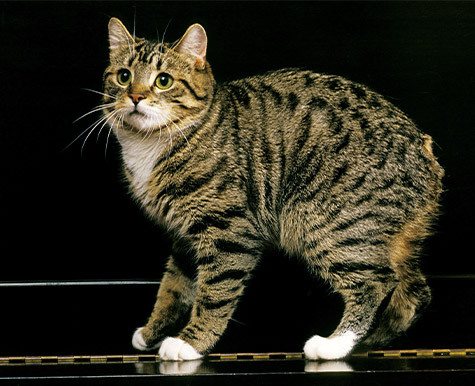
Manx
 Overview
Overview
Overview of Manx Cat
The Manx cat may look like many cats we know and love, but something is missing - their tail! Many speculate about how the Manx lost its tail. Some say that the Manx cat was running late for Noah's Ark, and when Noah slammed the door, he accidentally severed the poor cat’s tail in the process! These kitties get their name from where they come from - A Manx is anyone that hails from the Isle of Man, a self-governing island between Great Britain and Ireland. Manx cats are so beloved in their island nation, that they have been adopted as a symbol of national pride, even appearing on postage stamps! Not all Manx cats are born completely tail-less though; the gene for tail length is called “incomplete dominant”, so kittens in the same litter can have a full tail or no tail at all. The tail can also come in four different lengths: a completely tail-less kitty is known as a "rumpy”. Whereas a cat with a tiny stump is known as a "rumpy riser". A partial tail that can be curled or kinked is known as a "stumpy," and lastly, a "longy" is a kitty with a full-length tail. Only the rumpy (no tail), or a rumpy riser (a tiny stump tail), can compete in CFA cat competitions. You'll find Manx cats in coat colors such as red, white, and black to shaded silver. There are longhaired Manx cats called Cymrics that some cat fanciers' associations recognize as a separate breed. Despite not having a tail, this medium-sized (8-12 lbs) kitty has terrific balance and agility. With round heads, eyes, and cheeks, and a short body with hind legs much longer than their front legs, you can tell that you're looking at a Manx cat because their roundness makes them look like a bunny rabbit!
Common Health Conditions & Recommendations for Manx
Manx syndrome:
May develop in rumpy (no tail) or riser (stump tail) Manx cat due to their shortened spine. The incomplete formation of tail vertebrae can cause nerve and muscle fibers to be exposed, causing a lot of discomfort and possible motor control issues like loss of bladder or bowel control.
Recommendations for Manx syndrome in Manx Cats:
Common Health Conditions & Recommendations for Manx
Arthritis:
May be an issue in longy (full tail) Manx cats. The vertebrae may fuse together as they age, causing stiffness, a loss of mobility and severe discomfort
Recommendations for Arthritis in Manx Cats:
Common Health Conditions & Recommendations for Manx
Hairballs:
Can occur when a cat ingests loose hair that gets trapped in its tummy. The Manx cat is more likely to develop hairballs because of their dense coat.
Recommendations for Hairballs in Manx Cats:
 Personality
Personality
The Manx cat definitely compensates for the absence of their tails! These kitties are equipped with powerful back legs that are significantly longer than their front legs to help them balance and hop into their favorite perches. They may have short tails, but they do not fall short when it comes to their winning personalities! Manx cats bond deeply to their humans and love to please, so they will learn cool tricks, walk on a leash, and love following you from room to room, curiously studying your every move. Their dense double coat requires a good brushing 2-3 times per week to keep mats at bay. Despite how charming and adorable the rumpy (no tail) and rumpy riser (tiny stump tail) are, their shortened spine and missing vertebrae often lead to skeletal, neural and/or digestive problems collectively known as Manx syndrome. This fatal condition affects 20% of Manx kittens, so the Isle of Man has started research on sequencing their beloved cat breed, with the hopes of developing diagnostic DNA tests and reducing the spread of Manx syndrome.

 USD
USD
 Canadian Dollars
Canadian Dollars
